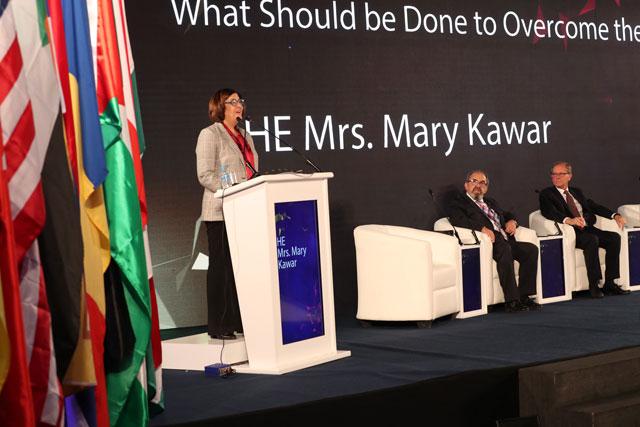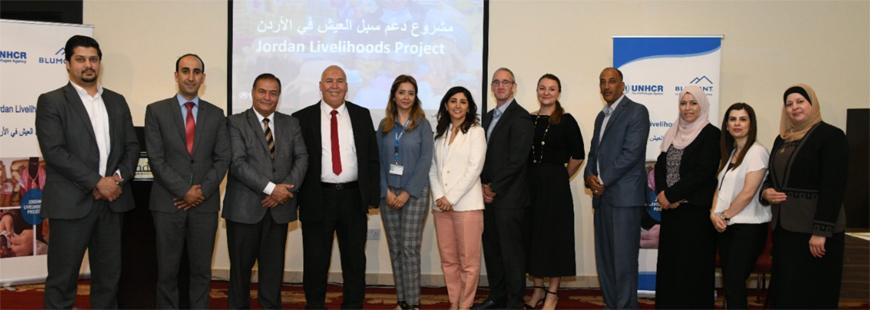You are here
Planning minister urges donors to support resilience, infrastructure and service projects
By JT - Nov 10,2018 - Last updated at Nov 10,2018

Planning Minister Mary Kawar speaks at the Rotary Institute 2018 Session on Migration at the Dead Sea this weekend (Photo courtesy of the Planning Ministry)
AMMAN — Jordan is home to every possible category of migrants, and hosts forced, voluntary and economic migrants, Minister of Planning and International Cooperation Mary Kawar said at the Rotary Institute 2018 Session on Migration, held at the Dead Sea on November 8-10 under the patronage of HRH Prince Hassan.
As of this month, Jordan’s total population exceeded 10 million, 1.4 million of which are Syrian refugees, making Jordan one of the largest refugee hosting countries in the world, according to Kawar.
Jordan’s innovative livelihoods approach towards refugees allowed 122,226 of them to be formally employed (with work permits) and integrated within the local labour market, the minister was quoted in a Planning Ministry statement as saying.
She pointed out that Jordan has reached “its maximum carrying capacity” considering the available overall resources and the national economic and financial reform programme with the International Monetary Fund, Kawar said.
“Existing physical and social infrastructure, as well as government services, are overstretched, thereby negatively impacting our ability to continue providing assistance to Syrians whilst maintaining adequate service levels for Jordanian citizens or risking hard-earned development gains,” she added.
Despite recent developments in Syria, the government of Jordan said it believes that many Syrians “will remain in Jordan for the months or probably years to come”, yet Jordan is looking to facilitate a safe return for Syrian refugees, the minister continued.
She urged donors to focus on investing in infrastructure projects and national capacities in Jordan and prioritising resilience related projects within the Jordan Response Plan for the Syria Crisis, as well as projects that provide refugees with the required training and skills to help them start over upon their return.
Kawar stressed that the only way forward is to target the development of national capacities while still considering the humanitarian needs of refugees and affected host communities.
She said the government is looking at how technology-enabled services can generate high quality jobs for both Jordanians and Syrians, and increase exports of services.
Home-based businesses that give women the freedom and flexibility to be economically active are also emerging as a national priority for the government, with new regulations “on the horizon” to enable Syrian women to establish home-based businesses independently.
In addition to Syrian refugees, Jordan’s labour market also accommodates a large number of voluntary and economic migrants, accounting for 23 per cent of Jordan’s labour force, according to the minister, who noted that the number of migrant workers in Jordan has tripled in the past 15 years, heightening the competition in the national labour market.
Paradoxically, around 10 per cent Jordanians are living and working abroad in 72 countries, 82 per cent of whom are in GCC countries.
Despite the loss of national talent, these migrant workers are still significant contributors to Jordan’s national economy, Kawar highlighted, citing remittances to Jordan averaging to 17.17 per cent of the GDP since 1972, according to World Bank data.
“Despite staggering costs and setbacks, we did not abandon our ambitious developmental agenda nor did we abandon a humanitarian commitment to refugee well-being. We had to balance short-term response with long-term visions. Hence, the solution to any forced migration scenario commences with a political will to commit to a solution at all levels of government,” Kawar concluded.
Related Articles
AMMAN — Abeer, a 36-year-old Jordanian woman and mother of four, was forced to take control of her family’s finances after the death of her
AMMAN — UNHCR Jordan and Blumont, an NGO that provides relief for refugees and host populations, on Wednesday signed six agreements with var
AMMAN — The Ministry of Labour has issued over 153,000 permits for Syrian refugees since the beginning of 2016, a United Nations High Commis













